Well, July in my region was pretty miserable, not as cold as usual but greyer and wetter. I much prefer colder but sunnier days! However, this is not a weather report, so on with the real news. July was a busy month for literary news with the announcement of a couple of awards and two shortlists. I’ll discuss those below.
Unfortunately, there was also sad news. Having lost Gillian Mears in May at just 52 years of age, Australia’s literary world was rocked again when Cory Taylor died in July, aged 61. She was a late bloomer in terms of publication, but my how she bloomed. Her 2011 debut novel, Me and Mr Booker, won the Commonwealth Book Prize for the Pacific Region, and her second novel, My beautiful enemy, was nominated for the Miles Franklin Award. Her third book, the non-fiction Dying: A memoir, was published just before she died. Only one of her books, My beautiful enemy, has been reviewed for the challenge, something it would be great to rectify. Anyone? Vale Cory Taylor.
By the way, apologies for this round-up being a couple of days late this month. Family business got in the way.
July’s Overview
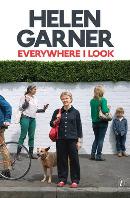 We had 26 reviews in July, seven fewer than last month, and three fewer than July last year. We’re going fine but a few more reviews would be lovely! Here are the highlights:
We had 26 reviews in July, seven fewer than last month, and three fewer than July last year. We’re going fine but a few more reviews would be lovely! Here are the highlights:
- Only one author – Helen Garner – was reviewed more than once this month, with two reviews for her latest book, Everywhere I look.
- Eighteen reviewers posted our 26 reviews – with me posting four reviews, and Brona (Brona’s Books), Jemima (Oddfeather), Jennifer Cameron-Smith, Jonathan Shaw (Me Fail? I Fly!), Kate (Books are my Favourite and Best), and Kim Forrester (Reading Matters) posting two reviews each.
- All but four of the books reviewed were first published after 2010, confirming our strong – and non-surprising I suppose – focus on contemporary writing.
The Classics
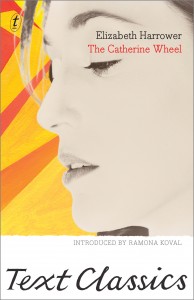 Although review numbers were down, there was a classic in the bunch, Elizabeth Harrower’s The Catherine wheel. Her third novel, it was first published in 1960 and was reviewed by Brona who found it “quite a tough read at times”. Can’t say I’m surprised given it’s Harrower we’re talking about. The Catherine wheel was Harrower’s only novel set in post-war London.
Although review numbers were down, there was a classic in the bunch, Elizabeth Harrower’s The Catherine wheel. Her third novel, it was first published in 1960 and was reviewed by Brona who found it “quite a tough read at times”. Can’t say I’m surprised given it’s Harrower we’re talking about. The Catherine wheel was Harrower’s only novel set in post-war London.
Brona found Harrower’s characterisation discomfortingly true. She wrote:
I would love to know who and what Harrower experienced in her life to give her such intimate insights into living with people who have a personality disorder.
She concludes her review with:
… I read the last part of the book very quickly, to be done with it as soon as possible and to get Christian out of my life for good!
Extraordinary writing and characterisation indeed, to evoke such strong emotions and reactions!
I haven’t yet come across a reader who doesn’t find Harrower powerful – and often disturbing!
Indigenous authors and issues
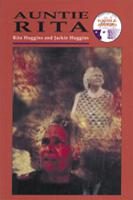 In July, Australia celebrates NAIDOC Week, when we “celebrate the history, culture and achievements of Aboriginal and Torres Strait Islander peoples”. I would therefore expect to see an increase in reviews of books by indigenous authors. As it turned out there were only three. One was by Yvonne (Stumbling Through the Past) who reviewed the 1994 mother-daughter written memoir, Auntie Rita. Yvonne writes:
In July, Australia celebrates NAIDOC Week, when we “celebrate the history, culture and achievements of Aboriginal and Torres Strait Islander peoples”. I would therefore expect to see an increase in reviews of books by indigenous authors. As it turned out there were only three. One was by Yvonne (Stumbling Through the Past) who reviewed the 1994 mother-daughter written memoir, Auntie Rita. Yvonne writes:
This book is not a standard memoir. It is also a dialogue between Rita Huggins and her daughter Jackie. At various points through the narrative Jackie Huggins expands on points her mother makes, add her memories and sometimes challenges her mother. In doing this both mother and daughter are unsettling the memoir genre. We are all social beings. We not only live in a social context, we are challenged and have to adjust our thoughts and behaviours in response to those we live and work with. Yet writing a memoir is one of the most solitary practices. The dialogue in this memoir gives us a peek into a mother/daughter relationship.
It’s over twenty years old now, and sounds like it should reach Classic status.
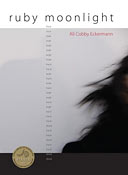 I did the other two reviews, one being for Ali Cobby Eckermann’s historical verse novel Ruby Moonlight. It is set in colonial South Australia around 1880 and tells the story of Aboriginal teenage girl, Ruby Moonlight, whose family is massacred by white settlers. If you are uncertain about verse novels, you might consider giving this a try. It is accessible and manages to tell a complex story, without getting bogged down. Here’s my assessment:
I did the other two reviews, one being for Ali Cobby Eckermann’s historical verse novel Ruby Moonlight. It is set in colonial South Australia around 1880 and tells the story of Aboriginal teenage girl, Ruby Moonlight, whose family is massacred by white settlers. If you are uncertain about verse novels, you might consider giving this a try. It is accessible and manages to tell a complex story, without getting bogged down. Here’s my assessment:
Ruby Moonlight is a special read that adds another perspective and voice to colonial contact narratives, a voice that pays respect to indigenous law and traditions, addresses the politics of contact, but also recognises our personal and universal need for love and companionship. It’s a warm and generous book, but it doesn’t pull punches either.
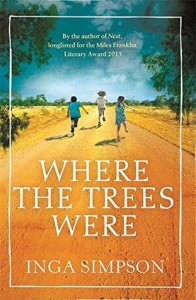 Two other books reviewed this month were written by non-indigenous authors but tagged as containing indigenous issues. White writers including “indigenous issues” can be problematic, but it’s my view that it can be even more problematic for non-indigenous authors to ignore indigenous people altogether. So, I’ll share the two books so tagged.
Two other books reviewed this month were written by non-indigenous authors but tagged as containing indigenous issues. White writers including “indigenous issues” can be problematic, but it’s my view that it can be even more problematic for non-indigenous authors to ignore indigenous people altogether. So, I’ll share the two books so tagged.
First is Inga Simpson’s Where the trees were reviewed by Carolyn on GoodReads. The story is about an older person wanting to right a wrong done in youth, and it has something to do with a clearing in a grove of carved trees. Carolyn writes that:
The conflict of the needs of farmers struggling on the land versus indigenous land rights is also raised as an issue for Jay’s community … Overall this is a gentle, thoughtful read with some well developed characters and will leave you with a nostalgia for a simpler time in our lives.
The other is Salt Creek by Lucy Treloar. Treloar’s coverage of indigenous issues – and the issue of a non-indigenous person writing indigenous issues – is specifically raised in the interview to which I refer again below. Here is the question and answer:
I am interested in the reaction since publication of your writing of the Indigenous characters. You state in the author’s note that “it would be inaccurate for them not to have presence”.
This is such a hard area. I tried to get some involvement from the Ngarrindjeri, but they declined when the publisher couldn’t give them final approval rights. I pulled right back from them at that point, very early in the writing, and worried about it more or less incessantly throughout. I felt that theirs was not my story to tell. My first person narrator helped with this. There was so much she couldn’t see.
Treloar clearly thought deeply about how to handle indigenous presence in her story.
Awards galore
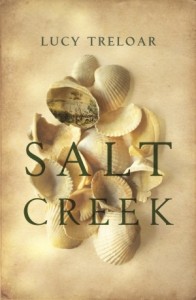 July is when, traditionally, the Nita Kibble and Dobbie Literary Awards for “life writing” are announced. Challenge convenor, Elizabeth Lhuede, posted on the winners – Fiona Wright’s Small acts of disappearance and Lucy Treloar’s Salt Creek – at the time. Both have been reviewed – several times – for the challenge. Michelle (Adventures in Biography) wrote up an online Facebook discussion with Lucy Treloar this month. The questions came from writing workshop participants. I’ll just share one that’s particularly relevant to readers:
July is when, traditionally, the Nita Kibble and Dobbie Literary Awards for “life writing” are announced. Challenge convenor, Elizabeth Lhuede, posted on the winners – Fiona Wright’s Small acts of disappearance and Lucy Treloar’s Salt Creek – at the time. Both have been reviewed – several times – for the challenge. Michelle (Adventures in Biography) wrote up an online Facebook discussion with Lucy Treloar this month. The questions came from writing workshop participants. I’ll just share one that’s particularly relevant to readers:
Do you have a particular trusted reader in mind when you write? Does this change for each piece of writing/project or does it remain the same?
That reader… I think I’m really writing for me, or people like me. Not my age, gender etc. But people who like books with heart and emotion, and an interesting world. I love to reread, and I love to hear from people who are rereading my book. I think, ‘yes, it was you I was writing for.’ I think it’s always that person for me.
A couple of days after the “Kibble awards” announcement, the ALS Gold Medal, an annual award for “a work of outstanding literary merit”, was announced – and this year the winner was biographer Brenda Niall for her book Mannix. Two of Niall’s books have been reviewed for the challenge, but not this one.
Two sets of shortlists were also announced in July. One was for the National Biography Award, and three of the shortlisted books were by women: Karen Lamb’s Thea Astley: Inventing her own weather, Brenda Niall’s Mannix, and Magda Szubanski’s Reckoning. Two of these have been reviewed for the challenge – you know which one hasn’t! – but none this month. Oh dear, I’m not doing well here!
The other shortlist was for the Western Australian Premier’s Book Awards. Several books by women writers were shortlisted for the fiction award: Elizabeth Harrower’s In certain circles, Elizabeth Harrower’s A few days in the country and other stories, Gail Jones’ A guide to Berlin, Joan London’s The golden age, Susan Midalia’s Feet to the stars and other stories, and Tracy Ryan’s Claustrophobia. All of these, except Susan Migdalia’s collection, have been reviewed for the challenge, but, again, not this month.
So, if you’d like to make a BIG contribution to the challenge, there are some ideas here!
———————
About Me
I am Whispering Gums and I read, review and blog about (mostly) literary fiction. It was reading Jane Austen when I was 14 years old that turned me on to reading literary fiction/classics, which is why I am here today doing this round-up! Little did Jane know what she started!
My love of Aussie literature started with Banjo Paterson’s ballads and Ethel Turner’s Seven Little Australians in my childhood. But, I didn’t really discover Australian women’s writing until the 1980s when I “met” and fell in love with Elizabeth Jolley, Thea Astley, Olga Masters, Helen Garner and Kate Grenville. Ever since then I have been making sure to include a good percentage of Australian (and other) women writers in my reading diet.






You certainly have provided us with an enticing list of books to read. I have been wanting to read Brenda Niall’s book for some time and her National Biography award win has prompted me to make it a higher priority. I’ll refer back to this post when I’m looking for ideas for fiction to read.
I agree that Aunty Rita should be added to the list of classic Australian books. It is always remembered and recommended in lists of quality life histories by Aboriginal authors.
I enjoyed reading this round-up. You wrote it well. Thank you!
Thanks Yvonne … and particularly because it’s added to your TBR. Yes, I noticed that Niall then also won, in August, the National Biography Award. I wasn’t going to read it but maybe I now should. I like Niall but I wasn’t particularly interested in Mannix though I know I should be!!